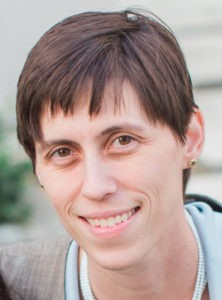There is a lot of time to think while sitting in the hospital — at least intermittently between all the doctor’s visits and texting the grandparents and friends about what is going on with the kiddo. The body is amazing in that it still holds mysteries even in the 21st century.
Under the glare of the hospital lights and the brain-numbing fatigue of staring at the same four walls, I find my wheels slowing spinning, turning out a tangled mess of thoughts interwoven with the lyrics “Rock the boat (baby), don’t tip the boat over.”

Amy Chilton
This month I had the great pleasure of inviting and welcoming Willie James Jennings as the baccalaureate preacher for Wingate University’s virtual service, where he preached a sermon titled “Becoming a Place.” He focused on Paul’s house arrest in Acts 28:30-31. Jennings admonished our graduates to be like Paul, who despite his own constrained conditions “welcomed all who came to him” (Acts 4:30).
Likening Paul’s house arrest to our own peculiar moment in time at (hopefully) the end of a global pandemic and in light of the Black Lives Matter push for racial justice, Jennings called us to a new vision of what we may be: connected. After teaching ethics for the last three years to American students who can inevitably read any philosopher or ethicist as individualist and libertarian (Aristotle, Kant, Rawls, you name it), I was thankful to hear him advocate a “subversive” way of connection that isn’t built on competition and that is more than “an individual quest for thriving” (take that, conservatives and progressives!).
But, what does it mean to “be a place”? Can a human be a place? And the deeper existential question: Do we want to live our lives toward building the common, shared, joined experience of our communities — even when we are living in our own personal, psychological and socially confined spaces? Can a 2,000-year-old story of a missionary imprisoned in his home country really help us set aside our all-consuming quests for personal fulfillment in order to become spaces where we, along with our communities, can envision a new life in which all can thrive?
“Do we want to live our lives toward building the common, shared, joined experience of our communities?”
I want to be clear here that I unequivocally disavow patriarchal expectations of women’s giving of themselves in hospitality in self-negating ways. Because we live in gendered societies, to critique self-fulfillment always requires this clarification. Patriarchy has foisted on men and women sinful ways of being in which self-fulfillment negates the life-of-Christ-in-community (male) or in which giving-of-the-self does the same (female). We never should place ourselves and communities in an antagonistic relation that undoes either.
Perhaps Mary’s questioning of the angel Gabriel in Luke 1:34 (“how can this be?”) can show us how to hold together our own agency and a vision for a new way of connecting based not on competition but on the life that her Son lived.
I recently read a seminary president’s blog in which she said that the hardest things in life are worth not going it alone. As I sit in the hospital, constrained by the urgency of the situation and the remaining COVID protocols, I’m stuck on this thought: How can we possibly survive if we go this alone? And why would we ever make others go it alone?
Competition and individualistic self-fulfillment are alive and well in the church. Sometimes we are the ones left bobbing in the middle of the ocean desperately hoping for a lifeline. Sometimes we are the ones who pushed someone else out and drove the boat away.
“How can we possibly survive if we go this alone? And why would we ever make others go it alone?”
What does it mean to ”be a place” when our own personal constraints or social or church expectations would have us leave others to go it alone so we might find fulfillment? This, I think, is an important question in the wake of a pandemic and ongoing racial and social divides that have isolated us. Sure, we may have learned a few things about ourselves or how to bake sourdough over the last year, but I hope we also have gained a bit of resolve not to go it alone or make others do the same.
A good place to start in sorting out what it means to be a place is with the story of Mary, recognizing with her questioning that self-agency can and should stand together with being a place of vision and hospitality for others. Those with power, with skills, with resources perhaps, sometimes have to rock the boat, have to talk back to the angel, but they/we never should tip the boat over and leave others to flounder alone. During times of crisis, we should not imagine we can catch ourselves in our own safety nets, content to let others go it alone while we cruise into the sunset, oblivious to the desperate splashing left behind us.
What does it take to move forward from this place in history? Who are the people who will be the places of meeting where self and community exist in a new kind of connection? Lord, I pray it might be us.
Amy L. Chilton serves as visiting professor of religion at Wingate University in Wingate, N.C.


